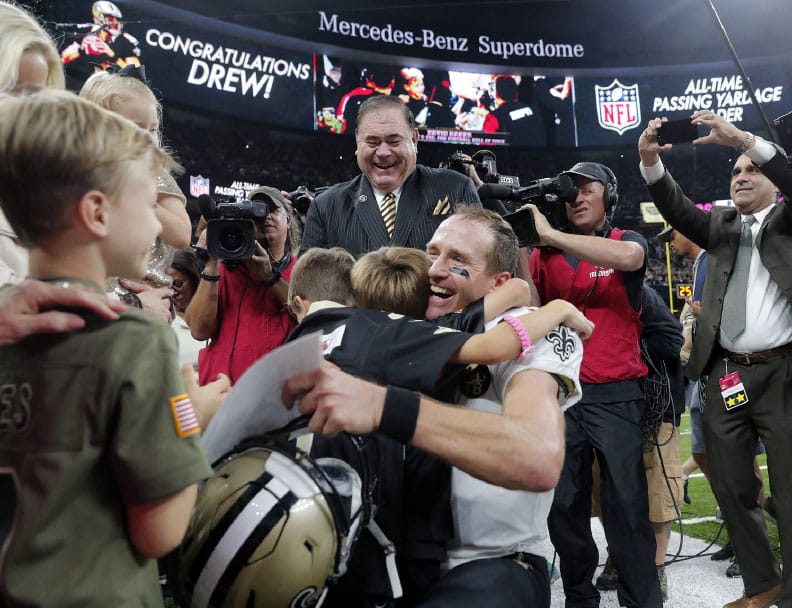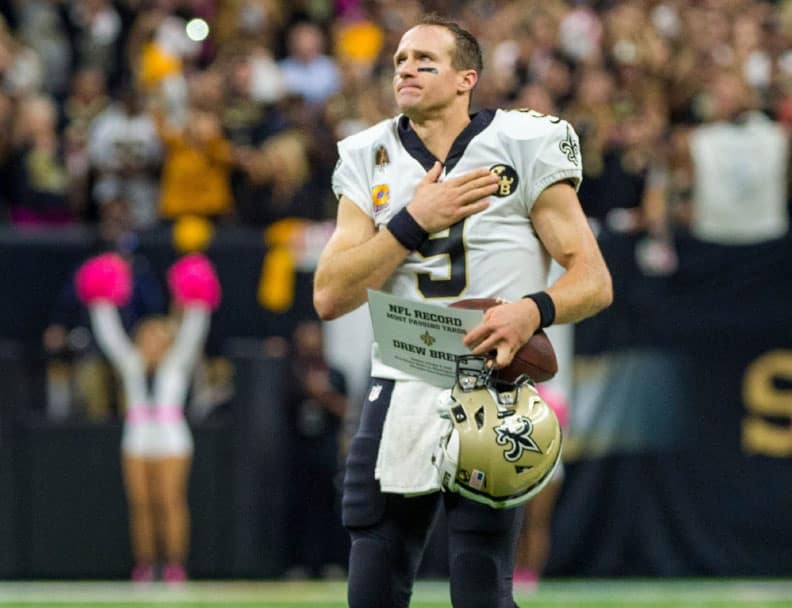An advance warning: I will be getting corny and sappy before too long. But at the end, I think you will give me a pass.
As a lifelong New Orleans Saints fan (that’s right — 1966 to present day), Archie Manning was always my favorite to wear the fleur-de-lis. I didn’t think it was possible, but about five years ago, I went from No. 8 to No. 9.
It took some doing, but Drew Brees inched ahead of Manning on my personal pecking order — not only for what Brees does on the field, but what he does away from his day job as well.
Keep in mind the timeline here. Brees won the Super Bowl MVP trophy by leading the Saints to the NFL championship during the 2009-10 season. You would think that would put him over the top, right? Hell become much colder that fateful night down in Miami when Brees and the Saints finally won the franchise’s first ever Super Bowl.
But Archie, and what he endured during those hard, difficult and embarrassing years with the Saints, cemented him in my heart as a personal icon.
It’s what Brees did between his signing with New Orleans in 2006, through the Super Bowl season of 2009, and then his amazing dedication, leadership, consistency and character over the last seven tumultuous years — not only with the Saints, but in the NFL as a whole — that solidified Brees’ legacy in New Orleans. His days in the Black and Gold will end someday, hopefully not too soon; and when they do, he will be the greatest Saint ever.
All the great and mighty in life and in sports have endured adversity and hardship. It made them who they are and built their core of strength.
Just take today’s hierarchy of Canton-bound quarterbacks as an example.
Tom Brady was a forgotten sixth round draft pick destined to walk the sidelines if not for an injury to Drew Bledsoe. Brady fought back from a devastating knee injury himself and dealt with the stress and fallout from Spy Gate and Deflate Gate.
Aaron Rogers had to carry that chip on his shoulder after falling late in the first round on draft day, and then nurse that same shoulder back to health from various injuries.
Peyton Manning overcame a neck injury that led the Colts to push him out the door — a condition that threatened his career and even his quality of life. Then came the whispers from critics that his arm was shot.
Brett Favre endured years of addiction to pain killers and his unceremonious eviction from the Green Bay Packers, those resume-tarnishing years with the New York Jets, and the investigation into alleged sex text photos sent to a female team employee.
But none of the above, and even many of the all-time great quarterbacks in the league, have overcome what Brees has faced.
It began when he was a 7-year-old when his parents went through an acrimonious divorce that resulted years later in an estranged relationship with his mother.
Brees missed his junior year as the starting quarterback at Westlake High School in Austin because of a torn ACL injury. He returned as a senior to win the coveted Texas 5-A state championship with an undefeated season, but received only two serious scholarship offers — from Purdue and Kentucky, two perennial basketball schools that seemed to play football because they had to.
At barely 6 feet, Brees always had to do more and do it better to prove to coaches and football executives he deserved to be the starting quarterback.
Then came the ultimate physical and mental test when his right throwing shoulder was nearly crushed during the final game of the 2005 season. It turned out to be his final game as a San Diego Charger.
Surgeries, setbacks, a sense of distress and the process of learning to throw again took an entire year. Brees then shopped his damaged arm around the NFL to anyone who would listen. He failed more than a few team physical exams and faced uncertainty about whether he could or would ever be allowed to play again.
Then there was a meeting with new Saints head coach Sean Payton. The connection and kinship resulted in a six-year, $60-million deal signed on March 14, 2006.
Imagine what was going through both of their minds when they started this NFL journey together; how they felt about the Saints’ history of losing, lousy drafts and bags on fans’ heads. And all of this was in a city that had lost more than 3,000 souls six months earlier and was completely destroyed by one of the country’s worst natural disasters in U.S. history — Hurricane Katrina.
Back home in Austin, Drees’ mother, Mina Brees, died in 2009 at the age of 59 from an apparent suicide from an overdose of prescription drugs.
Along the way, Brees dealt with a possible franchise move to San Antonio. He then lost his offensive coaching savant Payton for an entire 2012 season with an NFL imposed suspension from Bounty Gate.
In a passage from his book Coming Back Stronger, Brees put adversity in a unique perspective. “Many people would define the ‘good life’ as one that’s free from pain and hardship and heartache. But I’ve learned that adversity is actually an opportunity. It’s a gift, though it may not look like it in the moment. The difficulties life throws at you can be a doorway to something better — something you hadn’t even dreamed was possible.”
You judge a person’s character and heart more on how they survive the bad times life presents than on how they walk the easy road. The true measure of a man is not only his professional accomplishments, but also how he has loved and cared for his family, his friends and his community.
Here is where Brees has separated himself from many of his contemporaries.
His charity work and foundations are entrenched in both San Diego and New Orleans. He is a leader in the NFL Players Association, and has been an outspoken critic and a voice of reason on player safety and the controversial concussion issue still at the forefront of the league.
I have heard stories from friends who’ve bumped into Brees while he was walking his dogs or playing with his kids in City Park and struck up casual conversations. They have encountered him at times when he rushed into a Winn Dixie to buy flowers and stopped to talk with a Down Syndrome employee in the parking lot.
Brees sincerely connects with fans and everyday people who feel personally connected to him. It’s well known how much he loves New Orleans and the region. His time, efforts and fundraising to help rebuild the city and restore many of the lost children’s programs, parks and athletic facilities, is legendary and unmatched.
The 39-year-old Brees could have left during several free agent periods over the years for more money and a larger NFL market. But he didn’t. He stayed. He never held out in a squabble over money or contracts.
Brees simply let it be known how much he thought he deserved and the deal he was seeking and played on like the consummate professional he is.
Deceased owner Tom Benson, general manager Mickey Loomis and Sean Payton were always smart enough to give Brees what he wanted.
I took a weekend trip on the Saints’ charter jet to a game against New England a few years ago. We were asked by team officials not to talk to the players and coaches on their “business trip” flight. Brees was the only player who broke ranks, shook my hand and chatted a couple of times while he was walking the aisles.
I was in Miami on that Super Bowl-winning Sunday and had chills seeing Brees raise his firstborn son Baylen into the sky filled with confetti on the championship podium. Every time I think about it or see a photo from that day, I wish I had had my son Zachary with me.
Then, on the night when he finally broke Peyton Manning’s alltime NFL passing yardage record, Brees raced to the sideline to hug and kiss his wife Brittany and their four kids. He dropped to his knees and cradled his three boys in those long and powerful arms and told them how much he loved them. He earned the Dad of the Decade award when he told his sons, “you can accomplish anything in life if you’re willing to work for it.”
As a dad raising two young boys, I nearly lost it.
My go-to-Dad advice is “Be a leader. Work hard and do the right thing always. Make us proud and have pride in your work and yourself.”
All fathers say such things, I guess, but it was great to see Brees was part of the club and in Daddy mode right there in the midst of an NFL game.
When he was asked later why he chose those words to tell his sons during that chaotic and momentous moment in his career, Brees said he wasn’t thinking of himself, or the record or the game or the national TV audience. He was thinking of his boys and a teaching moment they will remember for the rest of their lives.
“That’s just what came to my heart,” Brees said. “That’s honestly what I whisper in their ear every night before they go to bed. I want them to approach life with a great sense of gratitude and humility and respect for others and just let them know they can accomplish anything in life they’re willing to work for. That’s the truth.”
Why can’t more prominent and star-crossed professional athletes follow Brees’ lead — you know, the guys who are always on camera, in the national spotlight, setting the trends and capturing all the attention for good and bad reasons.
Former NBA great Charles Barkley famously said, “I’m not a role model … Just because I dunk a basketball doesn’t mean I should raise your kids.”
He was right in some ways. But the Barkleys, Beckhams and Jalen Ramseys of the sports world can stop and learn a thing or two or three from Drew Brees.
Believe me, the vast majority of professional and college athletes are normal, hard-working, decent and respected people doing great things for their families and communities. Don’t let the few who aren’t tarnish the many who are.
Because of Brees’ high profile, we constantly see his impeccable standards in his family and NFL life.
All this, and I barely mentioned the latest record he broke, the many he already owns, and the ones he will soon set as he becomes arguably the most decorated and accomplished record-setting Hall of Fame quarterback in NFL history.
There’s a reason for that.
Because Drew Brees is so much more.
Rick Sarro’s perspectives and commentary can be heard on Soundoff 60 nightly, Monday through Sunday evenings, at 9 pm; broadcast on channel 4 on Suddenlink and is also broadcast on KSWL CBS Lake Charles on Saturdays before network SEC football coverage.




















Comments are closed.